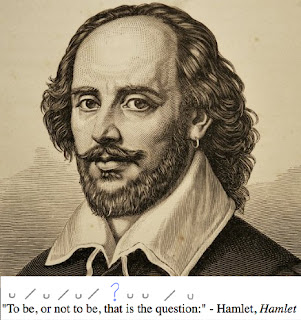The #1 Thing Modern Audiences Miss in Shakespeare
Ask any disgruntled high school English student: what's the funniest moment in all of Shakespeare? You'll probably get an answer like: Shakespeare's language is so stuffy; there's no humor in any of it. Or maybe: I guess what makes people laugh has really changed since Shakespeare's day. Is that true, or is there something in the text that modern audiences tend to miss?
What's the #1 thing that goes over modern audience members' heads? Probably the sexual jokes and innuendoes.
Because Shakespeare is usually approached only as a form "high art," modern audiences often forget that it was––and still is––meant to entertain. Under bits of the text that seems dense and complex to us can actually be moments of sexual humor.
Content warning: the text below contains sexual content.
Twelfth Night
Let's take our first example: an excerpt from Act II, Scene 5 of Twelfth Night (lines 85-89), when Malvolio finds the forged love letter that he believes is from Olivia.
Malvolio [taking up the letter]: By my life, this is my lady's hand: these be her very C's, her U's, and her T's, and thus makes she her great P's. It is in contempt of question her hand.
Sir Andrew: Her C's, her U's, and her T's: why that?
At first glance, these lines simply convey that Malvolio recognizes Olivia's handwriting. Right? Well, yes, they do tell us that Malvolio thinks the letter was written by Olivia, and that's important for the plot. But it's also a hidden sexual joke: C.U.T. was actually Elizabethan slang for a woman's genitals. So the seemingly innocent love letter has sexual traces. And "makes she her great P's" is a reference to Olivia going to the bathroom––another moment of body humor in the letter. Sir Andrew, of course, doesn't get the joke. That adds another layer of humor: they can laugh first at the sexual slang, then at the oblivious Sir Andrew.
Hamlet
Since we've looked at a comedy so far, now let's turn to a tragedy: an excerpt from Act III, Scene 2 of Hamlet (lines 250-253). This one is a little more explicit, but often overlooked.
Ophelia: You are keen, my lord, you are keen.
Hamlet: It would cost you a groaning to take off my / edge.
Ophelia: Still better, and worse.
This one is a little more straightforward: yes, "a groaning" means what you think it means. But let's go back to the beginning: Ophelia is complimenting Hamlet's wit, saying that he is "keen" (which means smart or clever). Hamlet plays off a different meaning of "keen": "keen" can also mean "eager for sex." Hamlet's response, then, means that he could make her moan. We can interpret Ophelia as being amused by Hamlet, as she says that he is "better" (because he's being witty) and "worse" (because he's being indecent) for having made this sexual joke.
All's Well That Ends Well
Your date is better in your pie and your porridge than in your cheek; and your virginity, your old virginity, is like one of our French wither'd pears: it looks ill, it eats drily
For the first meaning of the quip: a "date" is a fruit that one can put in "pie" or "porridge," or eat it directly (put it in your mouth, or "cheek"). But "date" also refers to age. So when Parolles says that it is better for a woman to show her age in her "pie" and "porridge" (both Elizabethan slang terms for vagina) than in her "cheek," he's saying that it's better for a woman to have sex when she is young than wait until she gets old. Parolles's second point directly answers Helena's question: how might a woman lose her virginity in a way that she enjoys? In a third meaning of "date," his response gets even more sexual: "date" is also Elizabethan slang for penis. So if the "date" is better in the "pie" and "porridge" than in the "cheek" (mouth)...we'll let you figure that one out. Parolles goes on to compare "old virginity" to a "French wither'd pear[]," a dried-up fruit––but also a reference to a syphilitic vagina. He compares virginity to the "French wither'd pear[]" on two fronts: first, "it looks ill," which means that it's unattractive. Second, it (the fruit) "eats drily." The verb "eats" here is being used in the sense of "tastes," so "it eats drily" means "it tastes dry." So, in just these two lines, Parolles advises Helena about when and how to lose her virginity, in very well-illustrated detail.




You missed the more glaring one in Hamlet III.3 where the prince implies that "nothing" is "a fair thought to lie between a maid's legs" - "nothing" being Elizabethan for genitals of either sex. Which also gives an edge to the comedy "Much Ado about Nothing".
ReplyDelete